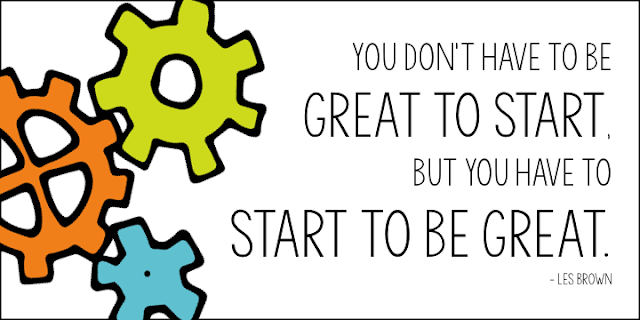Academies: Let's Get Started! (A "How-To" Guide)
Thursday, December 29, 2016
So, are you ready to give it a go? Here are some tips to help you get started.
Please note: There are many different ways to do this! The ideas below just represent some of the methods that have worked best for me. This is post #2 in a series. To read post #1, An Introduction to Academies, click here.)
How To Begin:
I begin with a Survey to inventory the interests of my students. I like to use a student survey that combines both closed and open-ended prompts. An open-ended question such as, "What do you like to do in your free time," is a great way to tap into students' individual and unique interests. The closed prompts, such as a checklist of interests, helps students to consider categories they might otherwise miss. The opportunity to choose their course of study is a new way of thinking for many students. The closed questions model some of the possibilities available and help them to think outside the traditional classroom curriculum. Once the surveys are complete, I sort the data and look for trends in student interest. I use these trends to seek out Academy presenters.
I administer the survey in the spring. This gives me the summer months to explore different Academy options and gather presenters. At the same time, I send a letter/survey to parents and school staff. The letter, which you can download below for free, explains the purpose of Academies and encourages members of our school community to share their interests, talents, and skills with our students. While staff members are often unable to donate their time because of the school schedule, they often have meaningful connections that they are willing to share.
The community is also a powerful place to find talent. I encourage you to partner with nearby colleges/universities, local businesses, and public organizations. They have a wealth of resources are often quite eager to support students and learning.
Once student interest has been established, I seek out expert presenters and create a calendar for the year. At my school, it works best to host Academies during the intervention/enrichment block; this way students do not miss any core classroom instruction. Academies take place every Friday and each session runs somewhere between 4-8 weeks, depending on the needs and availability of the presenter. Once the calendar is created, volunteers can sign up for the chunks of time that work best for them.
My Top Tips for Success:
Let me begin here with a disclaimer. A big one. I am still figuring it out myself. I began in the fall of 2012 and each year I do it a bit differently; I learn new lessons, I make new mistakes, and I add or take away elements. So, the tips below are not the "best" way; they are just my suggestions based on trial and error - and trial again.
1. Have a go!
Just try! Trust me when I say that when I began in 2012 I was NOT great. At all. In the beginning, I didn't always have enough presenters to offer a range of choice each week. Academy topics were sometimes driven by what volunteers were available - and it really didn't matter. Students were excited to learn new content and skills, and some students discovered interests that they didn't even know they had.
2. Start Small:
Start with one Academy and try it for 3-4 sessions. Academies do not need to be fancy or elaborate in order to be meaningful.
3. Be flexible:
Academies are ideally driven by student interest, so I've found that it is important to be adaptable. For example, in my first year, we had organized an Academy on American Law. Part way through the first session, the presenter posed an ethical question inspired by Harvard professor Michael Sandel about the value of one human life. The students were hooked. We spent the rest of the session debating this question. At the end of the first day, the presenter and I decided to change the Academy from American Law to Ethics in Modern Society. The students then spent the next three sessions thinking critically to tackle complex moral and ethical questions.
4. The Presenter is Key:
Just as a good teacher can make all the difference, so can a presenter. A perfect example is our Shakespeare Academy. This could have been a terribly dull and boring topic for 5th graders, but our presenter was dynamite! By the end of the first day, she had the kids composing a rap in iambic pentameter. The next week, she compared Romeo and Juliet to the Super Bowl, dividing students into two teams - the Montagues and Capulets - to play out the plot. Let me say in all honesty: I have never enjoyed (or understood) Shakespeare so much!
So . . . What do you think? Are you ready to give it a go? If you have questions, ideas, or need any help, I'd love to hear from you!






0 comments